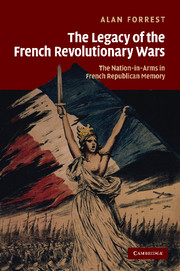Book contents
- Frontmatter
- Contents
- Acknowledgements
- 1 Introduction
- 2 Creating the legend
- 3 Napoleon and the blurring of memory
- 4 Voices from the past
- 5 The hollow years
- 6 The Franco-Prussian War
- 7 The army of the Third Republic
- 8 Educating the army
- 9 Educating the republic
- 10 The First World War
- 11 Last stirrings
- 12 Conclusion
- Bibliography
- Index
- Titles in the series
9 - Educating the republic
Published online by Cambridge University Press: 04 August 2010
- Frontmatter
- Contents
- Acknowledgements
- 1 Introduction
- 2 Creating the legend
- 3 Napoleon and the blurring of memory
- 4 Voices from the past
- 5 The hollow years
- 6 The Franco-Prussian War
- 7 The army of the Third Republic
- 8 Educating the army
- 9 Educating the republic
- 10 The First World War
- 11 Last stirrings
- 12 Conclusion
- Bibliography
- Index
- Titles in the series
Summary
To make citizen-soldiers, republicans believed that they first had to make citizens, which they would achieve by a concentrated programme of education starting from the very young years at school. Education in citizenship must be for all, and not just for the young men admitted to Saint-Cyr or France's other military academies, if they were to create a society inspired by the ideals of liberty and equality, where every citizen was conscious of his civic duty and of the sacrifice he might be called upon to make for the fatherland. The message which the political leaders of the Third Republic sought to convey – especially after the arrival in power of the radicals with the presidency of Jules Grévy in 1879 – was a simple one. The new republic, like the First Republic of 1792, was one and indivisible, its ideals inseparable from its revolutionary origins. This heritage was celebrated through a variety of strategies and media: the erection of statues in public squares; the resort to republican symbols on coins and banknotes; the imposition of busts of Marianne in every prefecture and every mairie in the land; the choice in 1880 of 14 July as France's national day, evoking quite explicitly the link between social progress and revolutionary violence; and the grandiose celebration in 1889 of the Centenary of the Great Revolution itself.
- Type
- Chapter
- Information
- The Legacy of the French Revolutionary WarsThe Nation-in-Arms in French Republican Memory, pp. 176 - 195Publisher: Cambridge University PressPrint publication year: 2009

